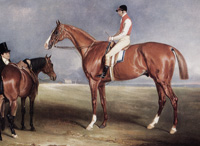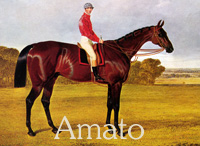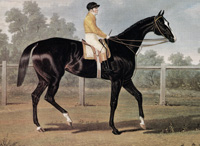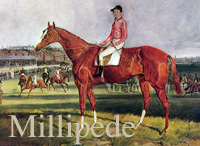|

Courtesy of Ackermann
& Johnson

Sire Line

King Fergus


Amato, by Velocipede

Queen
Of Trumps,
by Velocipede

Millipede, by Velocipede

|
Velocipede ch c
1825 (Blacklock - Mare, by Juniper). Sire Line
King
Fergus. Family
3-i. Velocipede was bred
by Mr Moss of York and first refused by Thomas Houldsworth
(breeder of the One Thousand Guineas winner Destiny
(ch f 1833 Sultan))
who was reputed to have said he would not pay sixpence
for such a light-boned colt. When a yearling he was
purchased for £120 by the jockey William Scott
(up) on behalf of Mr W Armitage. He was a brother
to Sir W Milner's King's Plate winner Malek (ch c
1824 Blacklock).
He was described
by "the Druid" as a king among horses although
blessed with a rough, "vulgar, Roman head,"
sporting a blaze with a pink nose which he transmitted
to his offspring. He exceeded the height of his dam
by about four inches, standing just over sixteen hands
himself.
Racing from 1827
to 1829 he numbered among his victories the York St
Leger and the York Gold Cup. In the Spring St Leger
Stakes at York, run over one mile and three quarters,
he was said to have "leaped out of the course"
on starting before being straightened, after which he
overtook the field, was never headed, and won in a canter
by one hundred yards. Although he didn't start for the
Derby he finished third in the Doncaster St Leger won
by The Colonel (ch c 1825 Whisker),
with Economist (b c 1825 Whisker)
well back in the field. His four year old campaign was
brilliant if short. He remained undefeated until his
ongoing tendon problem forced this "magnificent
cripple" to retire from the turf.
He covered first
in Yorkshire at Ainderby and later, as the property
of Mr Hobson, at the Shadwell Lane paddocks near Leeds.
Several years afterward he made his way to the Hobson
farm at Coney Hall, Cumberland. Velocipede has the distinction
of getting a Derby winner, Amato, an Oaks and St Leger
winner, Queen Of Trumps, and a Two Thousand Guineas
winner, Meteor.
He apparently contracted
some form of edema, "dropsy," along with respiratory
difficulty which, it was said, made his breathing audible
all over the yard. Unable to lie down, he "propped
himself against the wall, refusing all kinds of food
for three weeks before his death". The grand Velocipede
was shot in 1859, "not a day too soon," says
'the Druid', "on a hill overlooking the Irish Channel."
| Velocipede |
Blacklock |
Whitelock |
Hambletonian |
| Rosalind |
| Coriander
Mare |
Coriander |
| Wildgoose |
| Juniper
Mare |
Juniper |
Whiskey |
| Jenny
Spinner |
| Sorcerer
Mare |
Sorcerer |
| Virgin |
|
| Race
Record |
| |
| At 2: Won a 20 sovereigns each sweep at Catterick, beating
Mr Darnell's Gameboy (ch c 1825 Octavian), Mr Riddell's
Rector (b c 1825 Dr Syntax) and three others, won
£360 at York Spring, beating Mr Watts' Jenny
Mills (ch f 1825 Whisker),
Mr Churchill's Jour de Noces (b c 1825
Blacklock),
Earl Fitzwilliam's Ballad Singer (br f 1825
Tramp)
and five others, 2nd in 500 sovereigns sweepstakes at
Doncaster, won by Colonel King's Bessy Bedlam (br f
1825 Filho da Puta), beating Mr J Lee's Locket (b f
1825 Blacklock), Jenny Mills and two others, won £380
at Northallerton, beating Gameboy, Lord Cleveland's
chestnut colt (Comus), Mr Horner's Redlock (ch f 1825
Blacklock) and three others. |
| |
| At 3: Won the St Leger Stakes at York,
beating Mr Broadhead's grey colt (Viscount), Lord Scarborough's
Cambridge (b c 1825 Catton), Mr Watts' Coulon (b c
1825 Whisker) and one other,
3rd in the St Leger Stakes at Doncaster, won by Mr Petre's The Colonel (ch c 1825 Whisker),
followed by Major Yarburgh's Belinda (br f 1825
Blacklock). |
| |
| At 4: Won the Gold Cup at York Spring, beating Major
Yarburgh's Laurel (br c 1824
Blacklock), Lord Cleveland's
Nonplus (b c 1824 Catton) and Lord Kelburne's Actaeon
(ch c 1822 Scud) over two miles, won a match for 200
sovereigns at the same meeting, beating Bessy Bedlam
by several lengths, won the £935 Cup at Liverpool,
beating Sir T M Stanley's Dr Faustus (br c 1822
Filho da Puta), Laurel, Mr J Mytton's Chester Cup
winner Halston (b c 1825 Banker), Lord Grosvenor's
Pelion (b c 1825 Blacklock), Lord Sligo's Economist
(b c 1825 Whisker) and three
others, came out for the Stand Cup the following day,
found to be lame and retired. |
| |
| Notable Offspring |
| |
| Ainderby*
(ch c 1832), bred by Captain Taylor and imported into
Tennessee by Lucius J Polk of Mount Pleasant in December
of 1838. "As a 3-year old Ainderby, carrying 118
lbs, ran in the then unprecedented time (for 3-year
olds) of 1:43. Polk paid a 'high figure' for him."
From 1843 to 1854 Ainderby sired 25 winners of 37 races. |
| |
| Sister to Ainderby
(ch f 1831), 2nd dam of Henckel-Rennen and Union-Rennen
winner Emilius (b c 1857 Ephesus), of Preis der Diana
winner Emiliana (ch f 1862 Ephesus), 3rd dam of Preis
der Diana winner Libelle (br f 1869 Ostreger), of Zukunfts-Rennen
and Egyesittet Nemzeti es Hazafi dij winner Sabinus
(ch c 1875 Salamander), of Zukunfts-Rennen winner Espagnola
(b f 1870 Palestro), and 4th dam of Kentucky Derby
winner Buchanan (ch c 1881 Buckden). |
| |
| Amato (br c
1835), was bred by Sir Gilbert Heathcote (1773-1851),
4th bt, resident at the Durdans, near Epsom,
where he was a senior steward, prior to its
purchase by the Earl Of Rosebery. Amato won his
only start, the Derby Stakes, and died at the
end of January in 1843 without having served any
mares. |
| |
| Amorino
(b c 1840), bred by Sir Gilbert
Heathcote, and brother to Amato, above, won the Ascot Derby,
but shortly before Epsom pricked his foot with a
nail and was prevented from starting for the
Derby. He was described as a lengthy muscular
horse standing 15.3 with a fine action, quiet
temper and very sound legs. In 1847 he covered
at Moulton Paddocks, near Newmarket, for a fee
of 5gs. Via Queen Bee (br 1849) he appears in
the pedigrees of a number of Australian winners,
including Melbourne Cup winner Dark Felt (br c
1937 Spearfelt). |
| |
| Blue Devils
(ch f 1837), 2nd dam of Goodwood Cup winner
Saunterer
(bl c 1854 Birdcatcher), 3rd dam of Ascot Gold Cup
and New Stakes winner Rupee (br f 1857 The Nabob),
and of Prix du Jockey Club and Prix Lupin winner Suzerain
(br c 1865 The Nabob). |
| |
| Diggory Diddle
(ch f 1841), 2nd dam of Prix de Diane winner Tyrolienne
(b f 1872 Tournament), of Poule d'Essai des Poulains
winner Sire (b c 1870 Young Monarque), 3rd dam of Prix
Morny winner Strelitz (br c 1878 Boiard), and of Prix
Greffulhe winner Serge (b c 1881 Boiard). |
| |
| Elopement
(ch f 1839), 3rd dam of Middle Park Stakes winner and
useful stallion Plebeian (b c 1872 Joskin), and ancestress
of Ascot Gold Cup and Jockey Club Stakes winner
Love
Wisely (ch c 1893 Wisdom). |
| |
| Flash Of Lightning
(ch f 1843), dam of Royal Hunt Cup winner Jasper (ch c
1864 King Tom), and 2nd dam of Jockey Club Cup winner
Carnelion (b c 1872 Lecturer). |
| |
| Flight (br f
1831), 2nd dam of One Thousand Guineas and Oaks winner
Governess (ch f 1855 Chatham), of Oaks winner Rhedycina
(b f 1847 Wintonian), and ancestress of Belmont Stakes
winner Blue Larkspur (b c 1926 Black Servant) and Hopeful
Stakes winner Relic (bl c 1945
War Relic). |
| |
| Florence
(ch f 1839), dam of Champagne Stakes winner The Italian
(b c 1847 Touchstone). |
| |
| Her Majesty
(ch f 1832), dam of Champagne Stakes and Nassau Stakes
winner Princess Alice (b f 1843
Bay Middleton). |
| |
| Hornsea (ch c
1832), won the Goodwood Cup and will be ever remembered
as sire of the 3rd dam of
St.
Simon (br c 1881 Galopin). |
| |
| Sister to Hornsea
(b f 1837), 2nd dam of Chester Cup, Ebor Handicap,
Goodwood Cup and Great Yorkshire Stakes winner Nancy
(b f 1848 Pompey), and ancestress of the Irish Derby and Irish Two Thousand Guineas winner Baytown
(gr c 1925 Achtoi). |
| |
| Joe Lovell
(b c 1841), won the Great Yorkshire Stakes. |
| |
| Knight of the
Whistle (ch c 1838), won the Royal Hunt Cup. |
| |
| Lady Sarah
(ch f 1841), head of
Family
13-b, 2nd dam of Champagne Stakes, Ascot Gold Cup,
Goodwood Cup and Prince of Wales's Stakes winner Ely
(b c 1861 Kingston), of Grand Prix de Deauville winner
Bivouac (ch c 1868 Vermouth), of Magyar Kancadij winner
Georgine (ch f 1866 St Albans), and 3rd dam of Prix
du Jockey Club winner Florentin (ch c 1863 Florin),
and of Irish Derby winner St Kevin (ch c 1882
Arbitrator). |
| |
| Ladye of Silverkeld
Well (ch f 1839), a daughter of the inestimable
Emma (ch f 1824
Whisker),
was the 2nd dam of the Royal Hunt Cup winner Forbidden
Fruit (br c 1853 Birdcatcher
or Gameboy). |
| |
| Madame Pelerine
(b f 1832), dam of the One Thousand Guineas, Doncaster
Cup, Goodwood Cup (twice), Nassau Stakes and Park Hill
Stakes winner Canezou (br f 1845
Melbourne),
2nd dam of the St James's Palace Stakes winner Paletot
(br c 1852 Touchstone), of the Two Thousand Guineas
and Great Yorkshire Stakes winner
Fazzoletto (b c 1853
Orlando), and 3rd dam of the Ascot Gold Cup, Prix du
Jockey Club, Grand Prix de Paris, Prix du Cadran and
Prix Royal Oak winner Boiard (b c 1870 Vermouth). |
| |
| Meteor (ch c
1839), won the Two Thousand Guineas Stakes. |
| |
| |
| Millipede (ch c 1838), sometimes spelled
Milipede, won the Chester Cup for H Wormald in
1843. |
| |
| Mickleton Maid
(ch f 1836), won the Park Hill Stakes, 2nd dam of Ascot
Stakes winner Mouravieff (ch c 1856 Pyrrhus the First),
of Criterion Stakes winner Klarikoff (b c 1858 De Clare),
and of Great Yorkshire Stakes and Yorkshire Oaks winner
Klarinska (b f 1862 De Clare). |
| |
| Omnibus (b f
1831), dam of Union-Rennen winner John Bull (ch c 1841
Actaeon). |
| |
|
Queen Of Trumps br f 1832 (Velocipede - Princess Royal, by
Castrel).
Sire Line King
Fergus. Family
2-m. Bred by the Hon Edward Lloyd Mostyn M P, she was
considered by many to be the best three year old of
her generation and to her day the only horse to win
both the Oaks and St Leger Stakes. Her low sweeping
action was said to resemble that of her sire. Her speed
was somewhat tempered by her delicate constitution.
She was often required her to carry more weight than was
desired which compromised her ability to train on. She
ran at two (one start) and three, recording a string
of victories that included the Champagne Stakes at Holywell
Hunt, the £2654 Oaks Stakes, the £800 Dinner
Stakes at Liverpool, the £1800 Great St Leger
Stakes at Doncaster and the Stand Cup at Chester. In
the stud she was the 4th dam of the Ascot Stakes, Chester
Cup and Ascot Gold Vase winner Organist (b c 1871 Cathedral)
and ancestress of the good Canadian stallion Chop Chop
(b c 1940 Flares), sire of Queen's Plate winner Victoria
Park (b c 1957), and the speedy National Stakes winner
Wyndham (ch c 1933 Blenheim). |
|
|
| Rocbana (ch f
1831), dam of the stallion Paragone (b c 1843
Touchstone)
who got the remarkable matron Paradigm (br f 1852),
dam of the triple crown winner Lord Lyon (b c 1863
Stockwell), and
ancestress of most of
Family
1-j. Paragone was later highly successful in Germany,
getting the Henckel-Rennen and Preis der Diana winner
Doloritha (b f 1858), the Preis der Diana winner Margarethe
(b f 1857), the Henckel-Rennen and Union-Rennen winner
Pauline (b f 1861), and the Preis der Diana winner
Sinope (b f 1854). |
| |
| Valentinia
(ch f 1845), dam of the Park Hill Stakes and Stewards'
Cup winner Clotilde (b f 1852 Touchstone), and 2nd
dam of the Nagroda Prezydenta Rzeczypospolitej winner
Prim (b 1882 Highlander). |
| |
| Vanish (br f
1843), dam of the Park Hill Stakes winner Hepatica (br f
1855 Voltigeur), and 2nd dam of the Manchester Cup winner
Cambuslang (b c 1870 Cambuscan). |
| |
| Velocipede Mare
(ch f 1833), dam of the New Stakes winner Garrick (b c
1846 Lanercost). |
| |
| Verbena (ch f
1832), dam of the St James's Palace Stakes winner Uriel
(br c 1846 Touchstone), the Great Yorkshire Stakes
winner Umbriel (br c 1850 Touchstone or
Melbourne),
and of the stallion Ithuriel (br c 1841
Touchstone),
the latter a link in the branch of the
Camel
sire line that descends to Spearmint (b c 1903
Carbine) and beyond. |
| |
| Wood Pigeon
(br c 1842), winner of the Ascot Stakes
and the Ascot Derby. |
|

